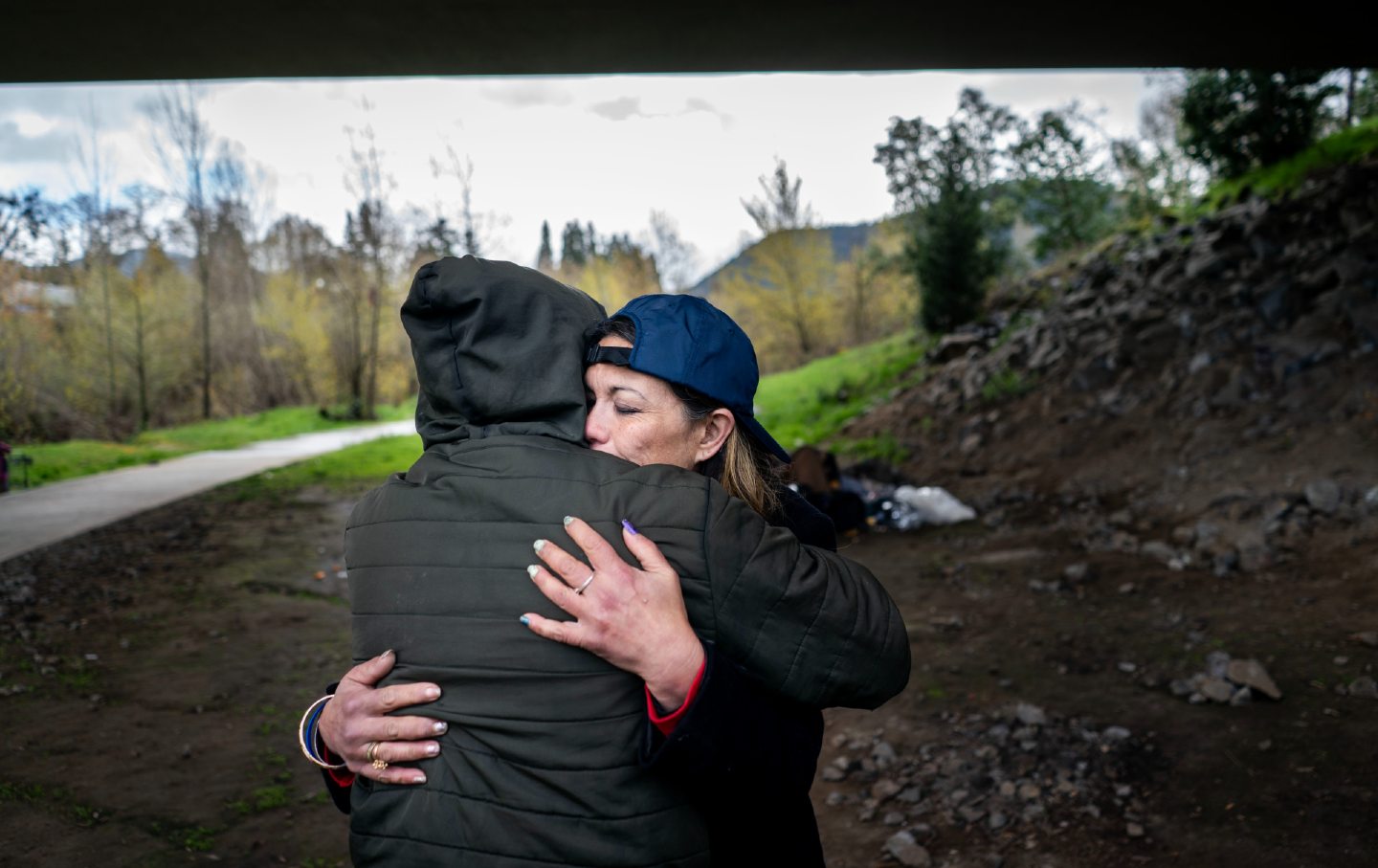Is Punishing People for Not Having a Place to Sleep Cruel and Unusual?
With Grants Pass, the Supreme Court appears set to allow cities, counties, and states to criminalize homelessness.

On a sunny, cold February day, I drove four hours from Portland, Oregon, to Grants Pass, a town of about 40,000 in the southern part of the state. I wanted to talk to residents about the homelessness crisis there and ask whether they thought the city should still be allowed to punish its roughly 600 unhoused people for not having a home.
Grants Pass has no operating emergency shelter. Yet a few years ago, it passed a number of anti-sleeping laws that made it impossible for people in the city without homes to avoid constant fines and jail time. Then, in 2022, the Ninth Circuit Court of Appeals issued a permanent injunction to bar the enforcement of such anti-homelessness provisions.
I headed to Morrison Park, where four people sat around a picnic table next to a pair of tents and a pickleball court. After I pulled into the parking lot of a carpet store across the street, a man came out to talk to me. He was angry about the people in the park, telling me that it was ridiculous that “people”—meaning people with homes—could no longer use their public spaces. He wanted to punish the homeless. Liberal policies, he said, had created chaos in deep-red southern Oregon.
Donald Trump won Josephine County, where Grants Pass is located, by 26 points in 2020, but Republicans are not alone in their antipathy toward the unhoused. The failure to generate affordable and supportive housing is bipartisan and widespread.
Between 2021 and 2022, the number of people experiencing homelessness increased in 41 states. Western states reported especially high rates. Between 2020 and 2022, Oregon saw a 22.5 percent spike in homelessness.
Two months later, I was on the other side of the country, at the Supreme Court, to hear the oral arguments in Grants Pass v. Johnson, a case that will determine whether city ordinances that impose civil or criminal penalties for involuntary homelessness constitute cruel and unusual punishment.
The case made its way to the Supreme Court largely because the Grants Pass ordinances were especially harsh. In addition to banning the use of bedding materials “for the purpose of maintaining a temporary place to live,” the city would sometimes shut off the water and close public restrooms in the parks. Helen Cruz, who has lived in Grants Pass since she was 4 and has been intermittently homeless, told me the ordinances were intended to make life uncomfortable enough that people would leave. “One cop even asked me, ‘Well, why don’t you just move?’” she recalled.
Liberal cities in the Ninth Circuit, such as San Francisco and Los Angeles, filed amicus briefs supporting neither party, and district attorneys from San Diego, Sacramento, and other blue cities joined Idaho, Montana, and 22 other states that support the city of Grants Pass and claim that the Ninth Circuit’s injunction removes the punitive tools needed to solve local homelessness issues.
The justices spent the two and a half hours of oral arguments discussing where the line should be drawn between the status of being homeless and the conduct associated with it. The status precedent comes from a 1962 case, Robinson v. California, which determined that a person cannot be punished simply for being addicted to narcotics. The justices ruled that the Eighth Amendment prohibits the state from punishing an act or condition if it is the unavoidable consequence of one’s status or being.
Ticketing people for having nowhere to go penalizes them for not being able to overcome skyrocketing rents, low wages, and a lack of healthcare. If the court—as seems likely—rules that cities, counties, and states can criminalize sleeping outdoors, this crisis will get worse. Laws likes the ones in Grants Pass will push unhoused residents further into poverty, harming their mental health and potentially leading to substance-use disorders.
Ask any case worker about homelessness, and they will list the barriers their clients face in obtaining housing: prior evictions, criminal records, and the inaccessibility of healthcare. Note that “lack of jail time” and “too little debt” are not on the list.
Even right-wing Justices Brett Kavanaugh and Amy Coney Barrett asked the counsel for Grants Pass where homeless people are expected to go after serving a jail sentence. The lawyer said that the jail would hypothetically connect people to services, but she had no good answer for what happens when housing and services are not available.
As in other places, people with disabilities, people of color, and LGBTQ individuals are disproportionately represented in the homelessness statistics for Grants Pass. All the homeless residents I spoke with had experienced trauma. We know what helps homelessness: affordable housing and healthcare.
Back in February, Helen Cruz told me there was a third thing that could help—something the Supreme Court could make more difficult. “People out here, they’ve got nothing to lose and nothing to look forward to,” Cruz said. “Just give them a little bit of hope, because a lot of them out there have none.”
More from The Nation

My Dystopian Novel Predicted Trump 2.0 My Dystopian Novel Predicted Trump 2.0
SOLIS was meant to serve as a warning of what could come. With Trump’s reelection, it should serve as a blueprint for the bravery and activism needed to fight back.

President Biden Should Issue a Blanket Pardon of Undocumented Immigrants President Biden Should Issue a Blanket Pardon of Undocumented Immigrants
Protecting Trump’s enemies from prosecution just reinforces the idea of politics as retribution. Instead, Democrats should be defending his most vulnerable targets.

The Supreme Court’s Hearing on Trans Rights Was Bigotry Masquerading as Law The Supreme Court’s Hearing on Trans Rights Was Bigotry Masquerading as Law
The conservative majority spent much of the oral arguments for US v. Skrmetti trying to erase the trans community.

Will There Be a Bird Flu Epidemic Under Trump? Will There Be a Bird Flu Epidemic Under Trump?
H5N1 currently poses a real threat for human transmission. Meanwhile, Trump’s picks for public health roles don’t bode well for vaccination.

Trans Medicine’s “Merchants of Doubt” Trans Medicine’s “Merchants of Doubt”
There is plenty of uncertainty involved in gender-affirming care—as in most aspects of medicine. But the groups behind the Tennessee ban aren’t driven by science—or patient care.

Donald Trump’s Second Administration Will Be As Women-Hating as Ever Donald Trump’s Second Administration Will Be As Women-Hating as Ever
"Your body, my choice" is only the beginning.


